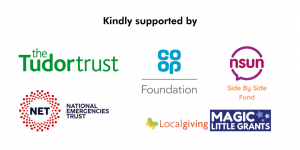In this blog, Lisa shares her story of grief as well as her experience as a member of the LGBTQ+ community. She also shares tips for showing allyship to LGBTQ+ grievers.
Coming to terms with my sexuality
I have known I was attracted to other women since I was in my teens. It was a difficult period in my life and I struggled to come to terms with this. I didn’t want to be this way and if you’d have offered me a pill to make me straight, I would have bitten your hand off to take it.
I fought against it for a long time; my sexuality and attraction to other women was in conflict with my upbringing, and at war with the life I had planned and imagined when I envisioned my future. I desperately wanted to be ‘normal’ and like my friends as they were talking about boys as adolescents and then as they began settling down to marry men and have families.
I fell in love in my late teens and early twenties and I grew to love myself and accept myself and my sexual orientation. To me, love is beautiful, regardless of the genders involved.
Coming out – again and again
Sexuality is highly personal, but the notion of ‘coming out’ never ceases. It’s not just one awkward conversation with your parents, family and friends. You are constantly ‘coming out’ to everyone you meet in life, if you feel safe and comfortable enough to do so. A new job, at university or meeting new friends – you may have to expose your sexuality, either directly or indirectly.
Humans are curious by nature and so people will enquire about your ‘husband/ wife/ boyfriend/ girlfriend’ or ask if you have children , and this may lead to having to go through the process of ‘coming out’ again and again – a concept sometimes lost on heterosexual people.
It is intimate information to share, in often public circumstances that may be distressing or unpleasant. It is exhausting, to have to constantly establish firstly if the person already knows about that area of your identity, and then work out if it is safe enough to share with them. Unfortunately, even in this ‘modern world’ it isn’t always safe to be a member of this community.
How grief impacts loss
Sexuality and sexual orientation can often have an impact on grief and loss and vice versa. I have experienced multiple losses in my life and being a member of the LGBTQ+ community has sometimes impacted that grief, often negatively.
When I lost my Mum in 2018, an old family friend approached me and asked how I was coping, and enquired as to the whereabouts of my boyfriend, and if he was supportive. It hit me like a knife to the heart – the presumption that I was in a relationship at all, let alone with a man. The person involved was well intentioned, but it was yet again society hitting me hard when I was at one of my lowest points.
People in society often make assumptions about people and the lives they live. I lost my daughter Isabella during pregnancy, and I have had many people make comments regarding this and my sexuality.
I have had people comment and ask very personal questions such as “You’re gay, so how have you had a baby?” which often leaves me flabbergasted and unable to answer. Even other parents who have lost children and are unfortunately also members of the baby loss community have made comments of a hurtful and derogatory nature.
Losing my baby was hard enough, and to have people ask such difficult questions and make such insensitive comments was very challenging. In my grief, I was made to feel even more marginalised than before.
Ways to show allyship
To anyone supporting a member of the LGBTQ+ community through loss, I would say use your words wisely. People within the LGBTQ+ may feel ignored or invalidated when grieving.
The use of language bias is so powerful, for example using the term ‘partner’ rather than a gender- specific term might put someone at ease. The same could be applied to those struggling with baby loss, or parental loss – rather than using the terms ‘Mum’ and ‘Dad’ we could use the term ‘parent’, which is more inclusive of all types of families. Using more ‘traditional’ terms might make the griever feel sidelined or invalidated and isolate them more and we all know that grief can be lonely enough.
There have been cases of misremembering or ignoring within deaths of the LGBTQ+ community, including instances of a transgender person being misgendered on their death certificate. There have also been instances where the individual was not ‘out’, leaving their partner without any rights or access to their deceased, unable to have a say in or even attend the funeral.
The biggest point I can make is to be kind. Open your hearts and minds to the fact that the grieving person or the deceased may have been a member of the LGBTQ+ community – their death should be handled sensitively and with courage, just as their lives have been.
Lisa
If you would like to share your story with us, please email blog@letstalkaboutloss.org.


